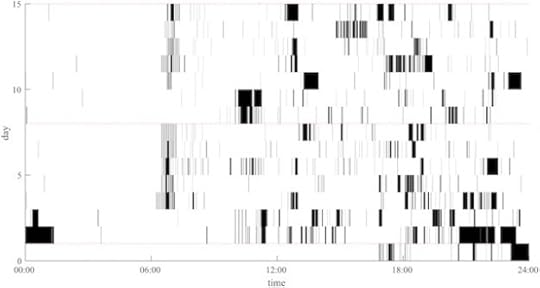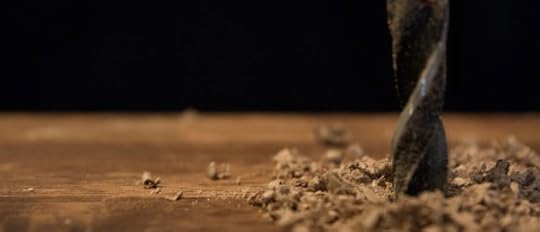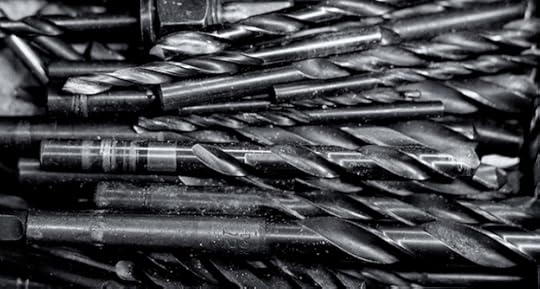Nicholas Carr's Blog, page 18
December 9, 2015
Elsewhere is the new here
In my last post, I reported on a study showing thatpeople massively underestimate how often they use their smartphones. Peopleconsult theirphones almost three times more frequently than theythink theydo. Yesterday, Pew came out with the results of a new surveythat revealed that more than a fifth of Americans, and more than a third of young Americans, report beingonline “almost constantly.” Given people’stendency to underreport gadget use, “almost constantly” means “constantly.”
Media seeks s...
December 1, 2015
You are your phone
The fact can no longer be avoided: You are your phone. The pattern of smartphone use is the pattern of the self. This is who you are:
The Wall Street Journal reports today that Silicon Valley lending startups are looking to base personal loan decisions on analyses of data from individuals’ phones. The apps running on a person’sdevice, entrepreneurs have found, “generate huge amounts of data — texts, emails, GPS coordinates, social-media posts, retail receipts, and so on — indicating thousand...
October 26, 2015
The new search
Jenny Hendrix has a finely measured review of Sven Birkerts’s new book,Changing the Subject: Art and Attention in the Digital Age,in Boston Review. Toward the end, before calling for a new poetry, she writes:
The activity conducted in both church and marketplace is a kind of search, which is of course central to what this technology is for: not just Google, but GPS, dating apps, Netflix, Facebook, Amazon—all guide us toward what they think we want. The shift from cathedral to bazaar represe...
September 28, 2015
How social media is shaping the 2016 race
Here’smy original version of an essay on social media’s influence on politics that appeared, in a somewhat different form, in Politico Magazineearlier this month. I’ll be discussing the subject at afreeevent at Harvard’s Kennedy School of Government on October 8, during Boston’s HUBweek.
The 140-Character Candidate
Barack Obama killed it onsocial media this summer. On August 14, a Friday, he kicked off a steamy Washington weekend by releasing a pair of playlists, one for the nighttime, one f...
September 16, 2015
Of drills and holes and Ronald Coase: the limits of sharing
“Why do people buy products?” asked Theodore Levitt, the celebrated Harvard Business School professor, at the start of his 1969 book The Marketing Mode. He suggestedan answer:
Leo McGivena once said, “Last yearone million quarter-inch drill bits were sold — not because people wantedquarter-inch drill bits but because they wanted quarter-inch holes.”People don’t buy products, they buy the expectation of benefits.People spend their money not for goods and services, but to get thevalue satisfac...
Of drills and holes and Ronald Coase
“Why do people buy products?” asked Theodore Levitt, the celebrated Harvard Business School professor, at the start of his 1969 book The Marketing Mode. He suggestedan answer:
Leo McGivena once said, “Last yearone million quarter-inch drill bits were sold — not because people wantedquarter-inch drill bits but because they wanted quarter-inch holes.”People don’t buy products, they buy the expectation of benefits.People spend their money not for goods and services, but to get thevalue satisfac...
Tech in schools: less is more
Although many educators and school administrators, including those working in the U.S. Department of Education, continue to push schools to invest heavily in computer technology, the evidence of any benefit from such investments remainselusive. The biggest beneficiaries of heavy spending onschool technology are technology firms. Students, meanwhile, may actually be harmed by having too much tech in the classroom, particularly when spending onhardware and software leavesless money for hiring...
September 13, 2015
Theses in tweetform: #51
51. If you steal another person’s shoes and put them on and I tell you I don’t like them, you’ll feel insulted; the same goes for ideas.
Donald bit my finger
Charlie’s shadow continues to lengthen.
I was thinking a littlemore today about social media’s influence on the presidential campaign, and suddenly I had thisrevelation. It struck me that Donald Trump’smedia strategy is identical to the one pioneered bythe tyke Charlie in “Charlie Bit My Finger,” the immortal2007 YouTube clip that Time magazine recentlydubbed “the Mount Rushmore of early viral videos.” (It’s closing in on a billion views — a YouTube unicorn!)
The best way to mesmerizean audie...
September 11, 2015
I left my
In his revealingQ&A session in June, Mark Zuckerberg offered a peek intothe future of interpersonal communication:
One day, I believe we’ll be able to send full, rich thoughts to each other directly using technology. You’ll just be able to think of something and your friends will immediately be able to experience it too if you’d like. This would be the ultimate communication technology.
Holy crap. That’s really going to require some incredible impulse control. Your innerfilter is going to ha...











